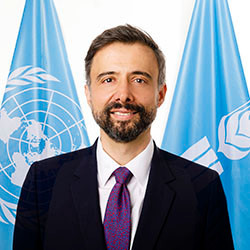Bridging the Gap: IFAD's Role in Climate Finance for Smallholder Farmers - COP28
IFAD Asset Request Portlet
Agrégateur de contenus
Bridging the Gap: IFAD's Role in Climate Finance for Smallholder Farmers - COP28
Statement by IFAD President Alvaro Lario
Par Alvaro Lario
Où: Dubai, UAE
01 décembre 2023Check against delivery
Distinguished panellists,
To be a success COP 28 must put adaptation on top of the agenda. Adaptation is as important as mitigation to shape a liveable future, save lives and protect farming activities vital for mankind.
The world is not prepared for the effects of climate change. Actions and investments to date to adapt are fully inadequate. International adaptation finance flows to developing countries are 10 to 18 times below estimated needs.
Even worse: the gap is widening. Financing needs are growing and adaptation investments are decreasing instead of accelerating.
In rural areas of developing countries, the lives and farming, livestock and fishing activities of hundreds of millions of people are at risk. Climate change will result in lower food production and high food prices. This mean more hunger, poverty, conflicts and migration.
Small-scale producers produce up to 70 % of the food in Africa and Asia and one third globally. They are key to global food security. Yet, they receive seven times less than the most conservative estimated annual needs for adaptation.
This is unfair and dangerous. We need to invest at speed and scale to ensure rural populations adapt to its impact now, so that there will enough food to feed the planet tomorrow.
The good news is, however, that we know solutions exist. I happily note the presence on our panel of representatives from Kenya and the European Union.
The recent provision of 10 million euros from the EU to IFAD and FAO to support the 'Boosting Sustainable Food Production in Kenya' project is most welcome. It aims to benefit 40,000 market-oriented smallholder farmers in Kenya through agroecological practices and improved access to subsidized agricultural inputs, technologies, and services.
These types of solutions are going to be central to our ambition to deliver climate finance at speed and scale
During IFAD13, our next funding cycle, we are aiming to deliver a programme of work of US$ 10 billion. This will enable us to double our impact, and significantly improve the lives of 100 million rural people
IFAD recognises its main target group- smallholder farmers- only receive 0.8% of climate finance while being among the most vulnerable. Thus in 2024, IFAD commits to achieving its 40% climate finance target across its portfolio through investing at least USD 666.1 million into climate change adaptation and mitigation.
In IFAD12, this 40% means roughly US$1.4 bn in climate finance being programmed to smallholders over 3 years. In IFAD13, with a higher percentage and a higher overall amount, this number is likely to be over US$1.8bn.
We are accredited to the Green Climate Fund, the Global Environment Facility and the Adaptation Fund, and as of December 2022, IFAD has mobilised approximately US$450M from these funds in the last three years.
The new replenishment will also strengthen IFAD’s role as an aggregator of climate finance, building on the successes of the Adaptation for Smallholder Agriculture Programme (ASAP) and the enhanced Adaptation for Smallholder Agriculture Programme (ASAP+).
This is in response to the understanding that a core part of closing the adaptation gap is understanding that we must attract private capital.
According to recent estimates, it will cost an extra $300 to $400 billion per year to make food systems more sustainable, equitable and resilient. This is beyond the scale of ODA and Public spending.
We believe that with the right incentives, we can attract private sector investment at scale to help close this gap.
I’ll share two brief examples of the types of solutions we are trying to attract the private sector.
Africa Rural Climate Adaptation Finance Mechanism (ARCAFIM). is a pioneering partnership between IFAD, GCF and like-minded partners.
This innovative initiative, with financing of USD 150 million in its first phase, integrates blended finance with a risk-sharing mechanism and targeted technical assistance. It's specifically designed to meet the financing needs for climate adaptation in poor rural communities across Kenya, Rwanda, Uganda, and the United Republic of Tanzania
By fostering resilience and sustainable development, ARCAFIM will contribute to less poverty and hunger in these countries, more sustainable agriculture, and resilience to climate and other shocks.
ARCAFIM is not just a project. It is a model that we expect to show once and for all the viability of large-scale public-private climate adaptation platforms. In time, we expect to expand this financing model to other markets.
And recently we had another significant milestone: IFAD's sustainable bond listing on the London Stock Exchange's Sustainable Bond Market was a first for a United Nations Fund and specialized agency, aside from the World Bank Group.
This move into the capital markets is part of IFAD's strategy to secure additional resources for vulnerable rural populations in low- and middle-income countries.
So overall, despite the fact that the global outlook for climate and food security is worrying, IFAD's comprehensive approach to food system transformation has shown promising progress.
Now is the time for great ambition and speed in our efforts. The world will not wait.
